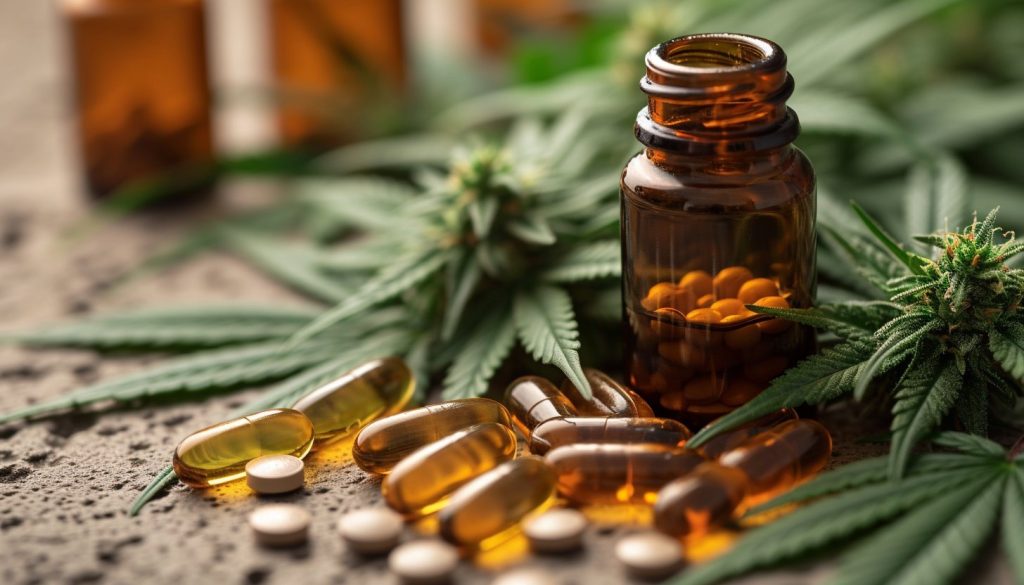In recent years, the use of CBD (cannabidiol) is enjoying increasing success due to its numerous health benefits. However, it is necessary to understand possible interactions with other medications you may be taking. This article focuses on the potential dangers of interactions between CBD and other medicinal substances.
Sommaire
ToggleWhy are drug interactions important?
Drug interactions can cause adverse health effects. Molecules present in our body can interact together in unexpected or undesirable ways, thus causing unpleasant or dangerous side effects. Drug interactions refer to changes in the properties of a drug when another substance is ingested at the same time.
When it comes to CBD, some studies have shown that it may influence how our bodies process and metabolize different medications. Therefore, it is crucial to know the risks associated with these interactions before adding CBD to your daily routine.
How can CBD interact with other medications?
The liver plays a major role in our ability to metabolize medications we ingest orally, that is, transform them into substances our body can use and eliminate. It does this through a group of enzymes called cytochromes P450, which are responsible for the metabolism of the vast majority of drugs on the market.
CBD and the cytochrome P450 enzyme system
Of the American studies demonstrated that CBD is a potent inhibitor of the cytochrome P450 enzyme system. This means that when present in the body, a number of these enzymes are no longer available to metabolize other drugs. In other words, CBD can affect the way your body processes certain medications by influencing their breakdown.
Possible consequences of this interaction
The inhibition of enzymes by CBD can have several consequences:
- Increased concentration of medications in the blood: If the breakdown of a drug in the body is slowed, it can lead to abnormally high blood levels and increase the risk of unwanted or even dangerous side effects.
- Reduction in therapeutic effectiveness: In certain situations, the interaction between CBD and a medication can reduce or even cancel their respective effectiveness, which would compromise the desired therapeutic action.
- Prolongation of drug elimination time: Slowing drug metabolism may result in an increased time needed to eliminate the drug from the body, requiring a reduction in dosage or spacing of doses.
Common medications known to interact with CBD
Although research on interactions between CBD and medications is still relatively limited, some studies have already identified a few classes of substances that may present problems when combined with CBD. Here are some examples:
Antidepressants and anxiolytics
Some studies suggest that CBD may have a significant impact on the way our bodies process antidepressants, including those belonging to the class of selective serotonin reuptake inhibitors (SSRIs) such as fluoxetine (Prozac) and sertraline (Zoloft), as well as anxiolytics such as diazepam (Valium). A potentially dangerous interaction is possible when these two types of medications are consumed at the same time as CBD.
Anticoagulants and antiplatelets
CBD could prolong the anticoagulant action of drugs such as warfarin (Coumadin) by influencing their metabolism. This could increase the risk of bleeding in patients treated for problems related to blood clotting.
Non-steroidal anti-inflammatory drugs (NSAIDs)
Some preliminary studies suggest that CBD may interact with nonsteroidal anti-inflammatory drugs (NSAIDs) like ibuprofen, potentially changing their effectiveness or increasing the risk of unwanted side effects, such as gastrointestinal problems.
Recommendations to minimize the risks of drug interactions
To avoid possible interactions between CBD and your usual medications, it is essential to take certain precautions:
- Consult your doctor: Before you start using CBD, talk to your doctor, especially if you are already taking prescribed medications. He can help you identify possible interaction risks and adapt the dosage of your treatments accordingly.
- Space out taking CBD and your other medications: Leaving a gap of a few hours between taking your CBD and taking your medications can reduce the chances of an interaction.
- Monitor side effects carefully: If you notice unusual or increased side effects after taking CBD in combination with other medications, consult your doctor or healthcare professional immediately.
It is important to remember that while CBD has interesting therapeutic potential for certain people, it can also induce dangerous drug interactions. Being aware of possible interactions, as well as close monitoring and communication with your doctor, can help you reap the full benefits of CBD while minimizing the risks to your health.



